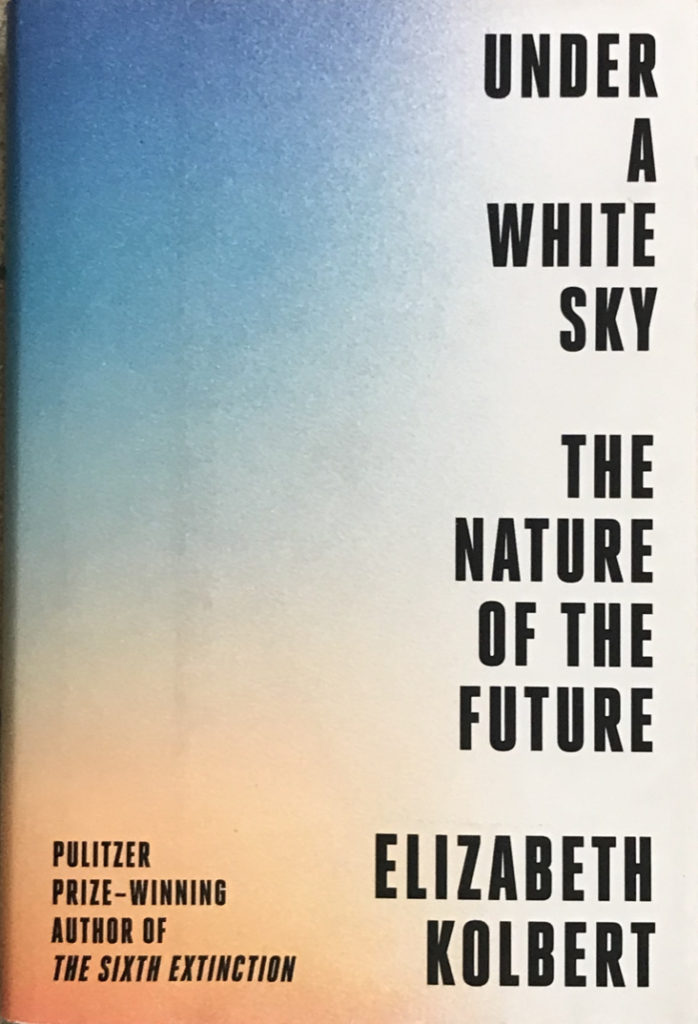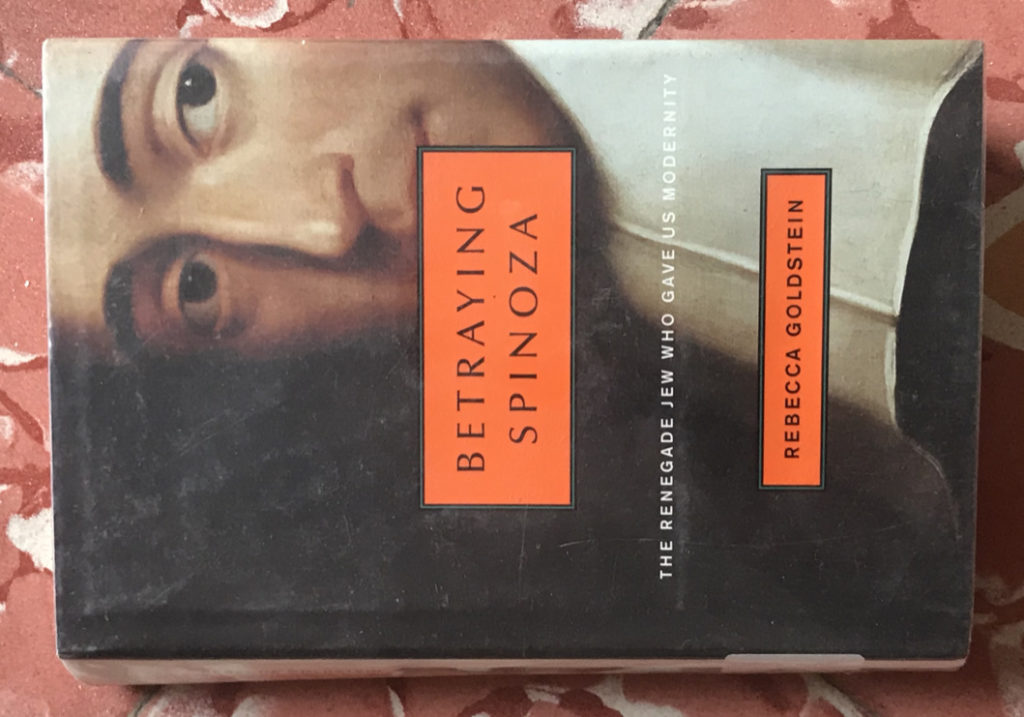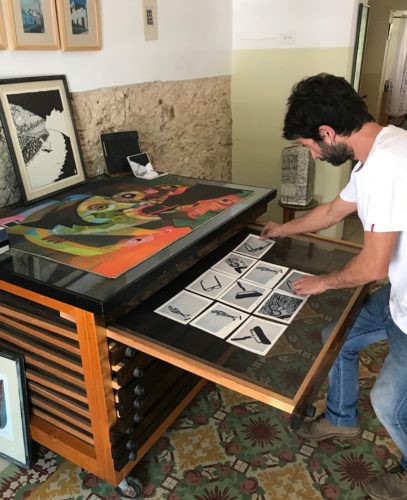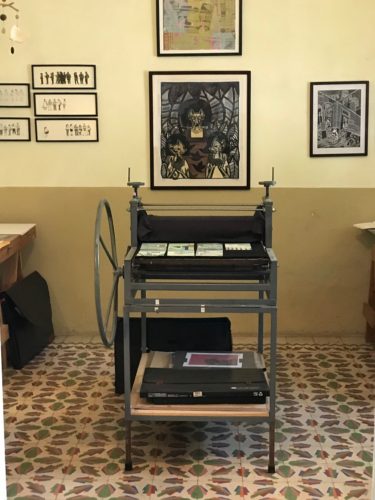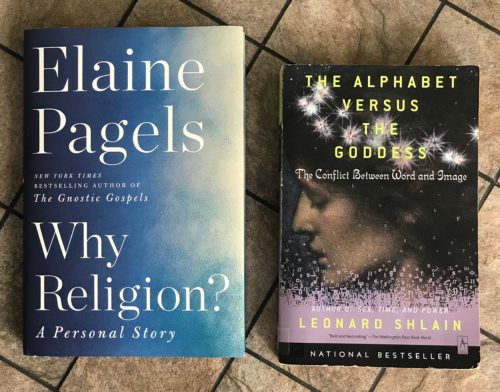I recently donated this important book to the collection. It’s about the inevitability of geo-engineering, to attempt to compensate for environmental damage that the human species has done to Mother Earth. The last half of the book is especially troubling. Note: books must be “quarantined” between borrowings. Expect delays.
Tag Archives: Merida English Library
A book NOT to be found at M.E.L.
In Walter Isaacson’s masterful biography of Einstein there is a footnote about an exchange between NY Regents (NY’s top group of high school educators) writing to ask Einstein what they should have students study. This was during the space-race with the Russians. His response: “have them read the biographies of the great ones.” While he didn’t name any, it is well known that Einstein was a big fan of Spinoza — especially of “Spinoza’s God”. But few have ever heard of the man. So, who was Baruch “Benedictus” Spinoza? Glad you asked.
He was recognized early in school as a prodigy, and was, perhaps, being groomed to be a rabbi — until he began to ask uncomfortable questions. (I liken this to a fictional character in my favorite children’s book: The Emperor’s New Clothes, who dared to announce that the king was naked.)
Spinoza was a deep student of the Hebrew scriptures, but dared to opine that Moses couldn’t have written these five books, called Torah – the “instructions”, or the “law”. Ooops! Nor could he believe that God would “choose” any group of people to be favorites. Double-ooops! Well, at the young age of 23, he found himself permanently excommunicated from his synagogue in 17th-century Amsterdam, and utterly marginalized by his own community, cursed. His brother (his business partner) was disallowed from even speaking with him. According to the writ, he was damned by all Jews for all time.
This didn’t seem to trouble him much. Rather, it was liberating. He was suddenly free to think and inquire, and hang out with other like-minded people, of which there were many in Holland. Most of these were “fringe” Christians (not Calvinists!); one was a former Jesuit. Spinoza began to teach his friends how to read Hebrew. He learned to write in Latin from the Jesuit. And he wrote deeply about his favorite topic: reality — which he was convinced was a spiritual topic: God, or Nature). He wrote a book titled ETHICS which is almost like a geometry textbook of axioms and theorems.
He had enemies among Jews, and Calvinists. Somebody tried to stab him to death, but only penetrated his heavy coat, leaving a big slash. He wore that coat for the rest of his short life. He was especially interested in logic and math. And tolerance. (He never joined a church.)
The biography depicted above suggests that the English philosopher John Locke, who spent five years in Holland shortly after Spinoza’s death, hung out with Spinoza’s fringe friends. Locke was later a big influence for US Founding Fathers (Jefferson, Franklin, et al) who drafted the US Constitution. It is possible that the concept of our First Amendment was benefited by Spinoza’s courageous free-thinking. Tolerance, and separation of church and state, are (were?) key factors in the success of the American nation. (Another famous Jewish philosopher, Karl Popper, offered what has become known as Popper’s Paradox of Tolerance) which we would do well to grasp.
But why my headline? For several years I’ve been donating important books to MEL, and of late have been offering to underwrite select books for approval by the Library’s Collection Committee, hoping to enhance the Philosophy and Religion section. But this Spinoza biography was declined, for “lack of shelf space” or for being “of marginal interest to our readers” or some other inscrutable reason. When I suggested that Spinoza’s Ethics, which the library owns (and is rarely borrowed, and is available free at Gutenberg dot org) could be replaced (deflating the “space” argument) with a biography which is more accessible, the rejection still stood. (I can’t tell if this is literary suppression, or something personal; but if you live in Merida, and wish to borrow my copy of the biography, leave a comment at the blog, which I will not publish; but I’ll contact you.)
This is a dangerous book, as it will have you thinking outside the box of dogma. Note: you can read a generous sample of Betraying Spinoza here, at Amazon — click on the cover to Look Inside. The book contains some Jewish words that are usually translated on the fly (once), by the author, who herself is a former Orthodox Jew, and a professor of philosophy at Princeton, as well as being widely recognized as a literary talent. (The question of identity: ¿Who am I? is a prominent feature in this book.) Dare to discover!
If you want to read Spinoza directly (in English translation) this might be a good place to start — but Goldstein’s biography, in my view, provides inspiring context of a courageous life well-lived and well-told.
Mérida’s Annual ARTISTS’ STUDIO TOUR
Reminder: this weekend is Merida English Library’s 7th-annual artists’ studio tour. It will last for two days this year. Tickets available at the library on c.53 between c.66 and c.68. Meet local talent. Buy direct.
TWO BOOKS : Why Religion?, AND, The Alphabet Versus The Goddess
Admit it. You’re a believer. You believe in something, many things. Anyone who has ever taken Philosophy 101 has heard this question: why is there something rather than nothing? (Nothing is what the rocks dream of, wrote Aristotle.) You “believe” but the varieties of belief are vast. Perhaps you believe in a god of wrath who, like santa claus, knows naughty from nice ; or in ha satan (Hebrew for the accuser: AKA satan, the boogey man) ; or in material reductionism (a determinism which denies free will, arguing that atomic force-fields comprise reality, denying that you have any choice) ; or in a Messiah (ever-present, or yet to come, and/or in an attendant Holy Ghost) ; or in The Church of Medicine (no heretics or free-thinkers allowed) ; or naturopathy ; or in sex-drugs-and rock’n’roll ; or simply in gardening your beliefs. Interpretation is everything. And culture shapes our beliefs. So, on to the two books . . .
I’ve just finished reading both books depicted above, back to back. What a fabulous experience! I read the Alphabet book first, but at 450 pages, I suggest you start with Why Religion?, as it’s faster paced, and gripping. I’ve enjoyed several books by Elaine Pagels, and am stunned by the candor of her storytelling here. It’s autobiographical — painfully so. She relates the loss of her first child, age 6, followed by the death of her husband, a prominent physicist, a year later while on a group hike, shortly after they had adopted two infants. (I’ll put her book alongside a classic by CS Lewis, titled A Grief Observed.) While the Pagels book could be prickly for someone recovering from loss of a loved one, her telling contains blessings, and surprises. (Read it before gifting it.) It contains much wisdom about consoling the bereaved. She deals with anger, rage, superstition, alcoholism, depression, theology, and much more.
Next, The Alphabet Versus the Goddess, was written by a nuerosurgeon who was also a competent scholar with interests in history, anthropology, language, and gender-issues. He, too, is a great storyteller — and his book argues compellingly that the world became a crueler place due to the invention of reading and writing, when matriarchy was displaced by patriarchy (and by its male hunting-parties and armies). Momma! –this book is an education. And it’s in the collection at Merida English Library, with a Dewey number of 302.22.
The Pagels book can also be found there, as I have donated my copy to the collection.

